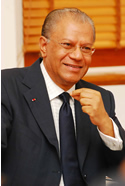Check Elections.mu, the new blog about politics in Mauritius.
Politics
La confiance du PM
Hier après-midi, le PM a animé une longue conférence de presse retransmise en direct par les stations de radio (ce qui a visiblement chamboulé leur programmation).
Qu’ai-je donc retenu de cet exercice?
D’abord, le PM est confiant, très confiant. Il paraît qu’il a commandé un sondage (ce qu’il a confirmé en disant même que l’échantillon est plus grand que celui de Sofres, donc plus fiable mais il n’a pas parlé du type de questions posées…) et que les résultats démontrent que son parti recueille une majorité de plus de 55%. Il joue donc avec l’assurance d’avoir les atouts pour dicter les règles du jeu. Il fait durer le suspense. Ira-t-il seul aux élections ou fera-t-il alliance avec le MMM et le MSM? Il s’est permis de fustiger tous ceux qui spéculent (la presse) et ceux qui veulent faire basculer en leur faveur le jeu des alliances y compris au sein de son parti et de son cabinet. Il ne s’est pas privé pour égratigner ses propres ministres (Tang par exemple) et ses fidèles (Sidaya).
Il sait que tous ses membres de parti lui prêtent une allégeance sans bornes, au point de se comporter en groupies aveugles et hystériques riant bêtement de ses blagues et applaudissant fièvreusement ses propos pour se faire bien voir. L’adoration du leader suprême est ici à son comble (et les autres partis sont aussi victimes du même phénomène).
Sa confiance est telle qu’il utilise un langage cru, voire grossier avec des termes peu dignes tels que ‘couyonade’, ‘mone amerdé’, ‘bézé’ et j’en passe et aussi des anecdotes qui blessent, un argumentaire proche de celui de la rue, voire des quartiers mal famés. De deux choses l’une, soit cela va rebuter les gens car cela manquait de finesse et de dignité, soit les gens se réjouiront que le PM parle le langage de la rue. Avinash et moi n’avons pas manqué de lever des sourcils sur les expressions, les anecdotes et le manque de direction dans un discours premier-ministériel qui ressemblait plutôt à un discours de chef de parti en meeting populaire à la sauce floklore locale. Mais bon, nous sommes peu représentatifs de la population, je suppose.
L’annonce en faveur du rétablissement de la peine de mort nous a fait bondir. L’argumentaire était pauvre sur ce sujet. Il a commencé par parler de la nécessité de durcir les lois pour punir les témoins dans les affaires de drogue (en référence à l’affaire Cindy Legallant et Sada Curpen) pour justifier cette décision applaudie par les aficionados du parti. Curieuse logique, n’est-ce pas?
Enfin, logique de la rue, de la foule hystérique, donc populaire. Il sera forcément reconduit à son fauteuil grâce à cela et grâce à l’imbécile attitude des partis d’opposition qui quémandent une allaince avec le PM. Ce sont eux les perdants dans tous les cas.
Nou, nou bizin continié manze pistas guetté ek subir sa cinéma ki de mové kalité la…
PS: Une décision mérite d’être saluée, celle de rendre obligatoire la présentation de la carte d’identité pour pouvoir voter. Il était temps!
Talk on News Media, New Media and Elections
The US Embassy in collaboration with the Communication Studies Unit of FSSH is organisinf a talk on the above theme by Ellen Hume, US Media expert, on Thursday, October 22, 2009 from 12 30-14 00 hours at the University of Mauritius.
The talk will the held in the old Engineering Building in Lecture Theatre 1 (to access, take the lift in the New Engineering Tower to the second floor, then take the long corridor on the left. LT1 is on the right at the end of the corridor).
Read the rest on the UoM-Communication Studies blog.
My trip to Madagascar
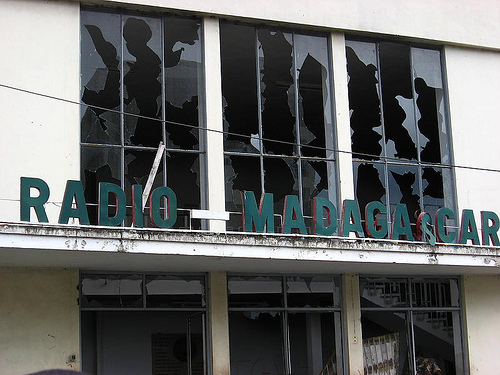
I was in Madagascar for three days last week upon an invitation of the FES (Friedrich-Ebert-Stiftung Foundation) to make a presentation on Freedom of Expression and of the Press at a workshop and to meet with local journalists. It was an eye-opening experience to witness all the difficulties faced by the local population and the journalists as well as other actors of civil society.
The political situation was very unstable and there were many crowd manifestations in town on the ‘Place du 1er Mai’ with some violent confrontations with the police resulting in many deaths, injured and arrests. Luckily, we were away from the hotel (which is just a few minutes walk from the hotspot) during the protests (which only take place between 11 a.m. and 4 p.m. according to a local friend). But, I did see the pictures and reports in the local press which were quite alarming.
The workshop which targeted potential young leaders in Madagascar went on well with a wide variety of participants (from ministries, courts of justice, NGOs, private sector and the press). There were even mothers with their babies as the FES favours a gender approach and thus hosts the women participants and a nurse for their babies to allow them to attend the working sessions.
Malagasy Journalists under pressure
The next day, we also met with some local journalists to discuss about press freedom in Mauritius and Madagascar. Many could not attend due to the political crisis, some had even been called by the Ministry for some explanations about their coverage of the protests. Journalists work under a lot of pressure and have very small salaries and virtually no safety net. One leading blogger journalist even said she had been interrogated once by the police for being suspected of allegiance to an ex-vice PM. Yet, paradoxically, though our press looks freer than theirs, they have lots of private TV stations whereas we have none. They have an ‘Ordre des Journalistes’ which we do not have. It would seem they have the proper framework but application is lacking and political tensions override the democratic system.
Before the workshop, we visited the remains of Radio Madagascar and TVM, which were both burned down by rioters in January. Radio Madagascar is not functioning any more as it is completely devastated but TVM is operating a minimum service with equipment recuperated from the presidential palace and personal equipment brought in by the journalists themselves. They had apparently just received state-of-the-art equipment a few months ago, which had been funded by a German organisation, all of which have vanished into black fumes.
Overall, it was a very enriching experience despite the crisis. It was sad to see the poor people living and working on the streets in very extreme conditions which make our island look like a very very modern country. But, at the same time, one could sense that there is enormous potential for development. It will all depend on how the political decision makers sort out their problems and decide or not to help their people and lift the country out of poverty…
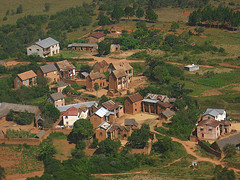
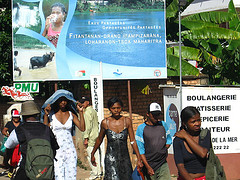
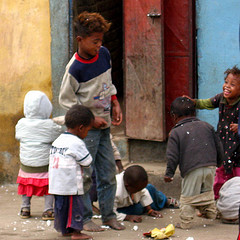
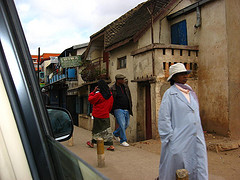
You can see more pics of the trip on Flickr at http://www.flickr.com/photos/noulakaz/sets/72157617434114366/
The ethnic epidemic-Republic of Mauritius
Photo courtesy of Avinash
Since the last few days, the talk of the town has been the unconstitutionality of the swearing in of three deputy prime ministers in this country. As we all know, these were designated to supposedly reassure the minority ethnic groups of this country (i.e. the Muslims, the Creoles and the Tamils). A silly calculation which most of our political leaders cannot seem to get rid of and most probably never will. It makes me even sadder when I hear some commentators claiming that if we are not careful to take everyone onboard, then there are risks… Surely, members of all the different ethnic groups of this country are not always carrying their ethnic-formulae packed calculators with them and assessing all decisions regarding nomination decisions in this country!
True, we have to take into consideration how representative our elected members of parliament are with respect to the demographics. BUT, it is saddening to see that we tend to focus only or much more on the ethnic criterion in this country. We also forget that competence is much more important. It should actually be THE factor par excellence. Then, if we can have wider ethnic representation so much the better but COMPETENCE should be the prime criterion, don’t you think?
A silly idea has come to my brain recently: what if we looked for a proper mixed-blood candidate for President / PM / etc. (with 50% Hindu, 16% Muslim, 3% Chinese and 31% General Population ancestors – based on the very dated 1972 census which is still used for the Best Loser System). Then, we’d be sure he or she is really representative of the population, isn’t it?
In any case, I wonder what extra duties these people have done just because they have been nominated DPM? Our Constitution provides for only one DPM and rightly so because he/she (hey, no-one talked about gender when more than 50% of the population is female!) can replace the PM when the latter is abroad (or dies or is sick or whatever…).
As for the successor of the President (which according to many may well be the current one himself), it’s the same story that is being dished out to us. Talk about a rancid meal, hey?
A play you must see: BARAZ
Incidentally, there was a very nice play which was staged on campus yesterday by Gaston Valayden and his Sapsiway group with the help of Amnesty International. It is a very simple story of two families from two different communities which are at loggerheads and decide to build a fence between their houses. The play is vibrantly acted by very able actors and the references are very realistic. It has a very harsh but true depiction of how our local politicians use divisive techniques (‘NOU BANNE’ vs ‘ZOT BANNE’) to gain votes and maintain the population in intellectual infancy.
The representation comes, according to me, at a very telling moment when the very loudspoken so-called representatives of ethnic groups of this country are competing to plead for ministers from their group in the context of a possible reshuffling of cabinet.
Speaking of cabinet, this makes me want to flush out all those silly people with silly arguments that can only make us become more silly as a nation. Cry, our beloved country!
Back to life

Photo courtesy of Avinash
This blog has been dormant since May (yes, more than 4 months). So, it’s about time I brought it back to life. What happened? Well, the usual. Got busy doing many things, inter alia,
– playing a very tiny role in Wassim Sookia’s last film Rouzblézonnver, which won lots of first prizes in the MFDC festival
– acting as member of Mauritian assessment panel for the African Media Barometer of the Friedrich Ebert Stieftung Foundation
– being part of several committees for media campaigns at national level
– organising talks and being invited to several others
– getting busy for the UOM Research Week where we had the opportunity to test our cameras for micro-interviews with some volunteer students acting as journalists
– and of course, fun with the family at the hotel and for a series of birthday parties (no less than three parties for Anya alone!)
The latest activity was today when we were invited to a digital video conference at the US embassy about the nominating conventions for US presidential elections. This was the second DVC I attended and it was quite interesting though fraught with technical problems (aha, our infamous internet connection) and also intense debate between the speakers from Paris (a Republican vs. a Democrat!).
There were also some high profile local politicians (specially from the Opposition) which limited opportunities for asking questions as they tended to be given priority. It’s sometimes funny to see how politicians turn up and become active for all sorts of events when they are in the Opposition. Naturally when in government, they have other things, more important to do, which must have been the case of current members of government, of course, since they did not turn up…

